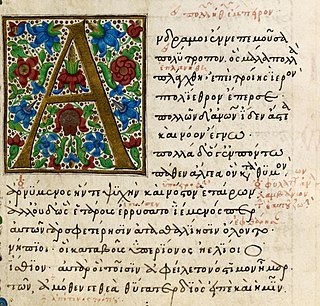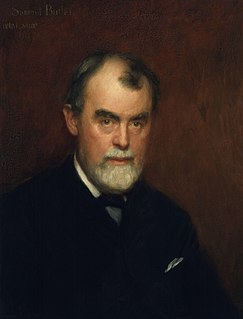Phantasia is the name of an ancient Egyptian woman who was said to have been the author of the immediate sources of the two ancient Greek epics, Iliad and Odyssey , attributed to Homer.

The Iliad is an ancient Greek epic poem in dactylic hexameter, traditionally attributed to Homer. Set during the Trojan War, the ten-year siege of the city of Troy (Ilium) by a coalition of Greek states, it tells of the battles and events during the weeks of a quarrel between King Agamemnon and the warrior Achilles.

The Odyssey is one of two major ancient Greek epic poems attributed to Homer. It is, in part, a sequel to the Iliad, the other Homeric epic. The Odyssey is fundamental to the modern Western canon; it is the second-oldest extant work of Western literature, while the Iliad is the oldest. Scholars believe the Odyssey was composed near the end of the 8th century BC, somewhere in Ionia, the Greek coastal region of Anatolia.

Homer is the legendary author of the Iliad and the Odyssey, two epic poems that are the central works of ancient Greek literature. The Iliad is set during the Trojan War, the ten-year siege of the city of Troy by a coalition of Greek kingdoms. It focuses on a quarrel between King Agamemnon and the warrior Achilles lasting a few weeks during the last year of the war. The Odyssey focuses on the ten-year journey home of Odysseus, king of Ithaca, after the fall of Troy. Many accounts of Homer's life circulated in classical antiquity, the most widespread being that he was a blind bard from Ionia, a region of central coastal Anatolia in present-day Turkey. Modern scholars consider these accounts legendary.
According to a fiction retold by the Byzantine scholar Eustathius of Thessalonica and attributed by him to "a certain Naucrates", Phantasia, daughter of Nicarchus of Memphis, an inspired poet, wrote poems about the war in the plains of Troy and the wanderings of Odysseus, and deposited these books in the temple of Hephaestus at Memphis. Homer afterwards visited the shrine, persuaded the priests to make copies of the books for him, and afterwards wrote the Iliad and Odyssey. "Some say" [Eustathius adds] "that Homer himself was Egyptian; others, that he visited the country and was taught by Egyptians."

Eustathius of Thessalonica was a Byzantine Greek scholar and Archbishop of Thessalonica. He is most noted for his contemporary account of the sack of Thessalonica by the Normans in 1185, for his orations and for his commentaries on Homer, which incorporate many remarks by much earlier researchers.

Memphis was the ancient capital of Aneb-Hetch, the first nome of Lower Egypt. Its ruins are located near the town of Mit Rahina, 20 km (12 mi) south of Giza.

Odysseus, also known by the Latin variant Ulysses, is a legendary Greek king of Ithaca and the hero of Homer's epic poem the Odyssey. Odysseus also plays a key role in Homer's Iliad and other works in that same epic cycle.
The story is one of the least known of the biographical fictions about Homer; it is mentioned neither by Samuel Butler nor by Andrew Dalby, both of whom have developed the argument that a woman poet was responsible for the Odyssey.
When studying literature, biography and its relationship to literature is often a subject of literary criticism, and is treated in several different forms. Two scholarly approaches use biography or biographical approaches to the past as a tool for interpreting literature: literary biography and biographical criticism. Additionally, two genres of fiction rely heavily on the incorporation of biographical elements into their content, biographical fiction and autobiographical fiction.

Samuel Butler was the iconoclastic English author of the Utopian satirical novel Erewhon (1872) and the semi-autobiographical Bildungsroman The Way of All Flesh, published posthumously in 1903. Both have remained in print ever since. In other studies he examined Christian orthodoxy, evolutionary thought, and Italian art, and made prose translations of the Iliad and Odyssey that are still consulted today. He was also an artist.

Andrew Dalby, is an English linguist, translator and historian who has written articles and several books on a wide range of topics including food history, language, and Classical texts.
Note: An earlier author, Photius of Constantinople, attributes this to Ptolemy Chennus (a Greek mythographer active 1st to 2nd century AD?).

Photios I, , also spelled Photius or Fotios, was the Ecumenical Patriarch of Constantinople from 858 to 867 and from 877 to 886; He is recognized in the Eastern Orthodox Church as Saint Photios the Great.
Phantasia, a woman of Memphis, daughter of Nicarchus, composed before Homer a tale of the Trojan War and of the adventures of Odysseus. The books were deposited, it is said, at Memphis; Homer went there and obtained copies from Phanites, the temple scribe, and he composed under their inspiration.

In Greek mythology, the Trojan War was waged against the city of Troy by the Achaeans (Greeks) after Paris of Troy took Helen from her husband Menelaus, king of Sparta. The war is one of the most important events in Greek mythology and has been narrated through many works of Greek literature, most notably Homer's Iliad. The core of the Iliad describes a period of four days and two nights in the tenth year of the decade-long siege of Troy; the Odyssey describes the journey home of Odysseus, one of the war's heroes. Other parts of the war are described in a cycle of epic poems, which have survived through fragments. Episodes from the war provided material for Greek tragedy and other works of Greek literature, and for Roman poets including Virgil and Ovid.

Dodona in Epirus in northwestern Greece was the oldest Hellenic oracle, possibly dating to the second millennium BCE according to Herodotus. The earliest accounts in Homer describe Dodona as an oracle of Zeus. Situated in a remote region away from the main Greek poleis, it was considered second only to the oracle of Delphi in prestige.

In Greek mythology, Chryseis is a Trojan woman, the daughter of Chryses. Chryseis, her apparent name in the Iliad, means simply "Chryses' daughter"; later writers give her real name as Astynome (Ἀστυνόμη). The poet Tzetzes describes her to be "very young and thin, with milky skin; had blond hair and small breasts; nineteen years old and still a virgin".
In Greek Mythology, Arcesius was the son of either Zeus or Cephalus, and king in Ithaca.

Nausicaa is a character in Homer's Odyssey. She is the daughter of King Alcinous and Queen Arete of Phaeacia. Her name, in Greek, means "burner of ships".

The Epic Cycle was a collection of Ancient Greek epic poems, composed in dactylic hexameter and related to the story of the Trojan War, including the Cypria, the Aethiopis, the so-called Little Iliad, the Iliupersis, the Nostoi, and the Telegony. Scholars sometimes include the two Homeric epics, the Iliad and the Odyssey, among the poems of the Epic Cycle, but the term is more often used to specify the non-Homeric poems as distinct from the Homeric ones.
The Telegony is a lost ancient Greek epic poem about Telegonus, son of Odysseus by Circe. His name is indicative of his birth on Aeaea, far from Odysseus' home of Ithaca. It was part of the Epic Cycle of poems that recounted the myths of the Trojan War as well as the events that led up to and followed it. The story of the Telegony comes chronologically after that of the Odyssey and is the final episode in the Epic Cycle. The poem was sometimes attributed in antiquity to Cinaethon of Sparta, but in one source it is said to have been stolen from Musaeus by Eugamon or Eugammon of Cyrene. The poem comprised two books of verse in dactylic hexameter.
In Homer's Odyssey, Amphimedon was the son of Melaneus and one of the suitors of Penelope. While retreating from Odysseus's party during the final stages of the battle in the latter's hall, he gave a glancing blow to the carapace of Telemachus, to whom he fell shortly afterwards. In the Underworld, he told the story of the suitors' slaughter by Odysseus and Telemachus.

The Homeric Question concerns the doubts and consequent debate over the identity of Homer, the authorship of the Iliad and Odyssey, and their historicity . The subject has its roots in classical antiquity and the scholarship of the Hellenistic period, but has flourished among Homeric scholars of the 19th and 20th centuries.
Barry Bruce Powell is an American classical scholar. He is the Halls-Bascom Professor of Classics Emeritus at the University of Wisconsin–Madison, author of the widely used textbook Classical Myth and many other books. Trained at Berkeley and Harvard, he is a specialist in Homer and in the history of writing. He has also taught Egyptian philology for many years and courses in Egyptian civilization.

Events in the main sequence of the Odyssey take place in the Peloponnese and in what are now called the Ionian Islands. Incidental mentions of Troy and its house, Phoenicia, Egypt, and Crete hint at geographical knowledge equal to, or perhaps slightly more extensive than that of the Iliad. However, scholars both ancient and modern are divided as to whether or not any of the places visited by Odysseus were real.
Rediscovering Homer is a 2006 book by Andrew Dalby. It sets out the problems of origin, dating and authorship of the two ancient Greek epics, Iliad and Odyssey, usually attributed to Homer.
In Greek mythology, Paean, Paeëon or Paieon (Παιήων), or Paeon or Paion (Παιών) was the physician of the gods.
In Greek mythology, Briseus or Brises is the father of Briseis (Hippodameia), a maiden captured by the Greeks during the Trojan War, as recorded in the Iliad. Eustathius of Thessalonica, a commentator on Homer, says Briseus and Chryses were brothers, as sons of Ardys, with Briseus dwelling in Pedasus, and Chryses residing in Chryse; both were towns in the Troad. Pedasus was said by Homer to be Lelegian settlement, ruled by the Lelegian king Altes. Thus, Briseus may also have been a Lelegian. Other sources say that Briseus was a priest of Lyrnessus. According to Dictys Cretensis, Briseus hanged himself when he lost his daughter.
Hestiaea of Alexandria, also Hestiaea, was a scholar who wrote a treatise on Homer's Iliad that discussed the question whether the Trojan War was fought near the city then called Ilium, and which was cited by Demetrius of Scepsis. None of her work is extant.












